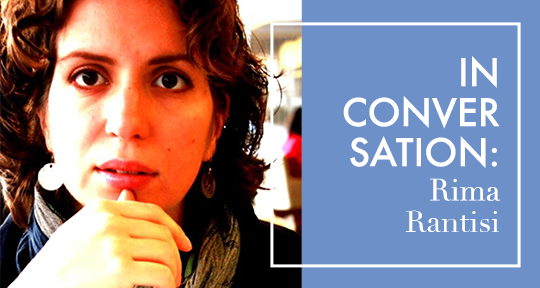Biography, The University of Hawaii Press’s quarterly academic journal, surveys the contemporary landscape of Lebanese and Arab women’s memoirs. In this, they have named Rima Rantisi as among the champions of “highly intimate personal narratives,” whose work portray their own “constructions of home.” As an essayist, Rantisi inhabits interiorities, taking time in its own tracts, but also incites reexaminations of how we think of (and therefore, how we read and write) the external—places we dwell in all our lives and have always felt ourselves to know. As an editor, she is a nonbeliever of geographic boundaries, welcoming works of art and literature from the ‘Arab-adjacent’ regions. How does she write about home, something ideally stable, when it happens to be a city that is ever-changing and fluid, a mere construct?
In this interview, I asked Rantisi about Rusted Radishes, the Beirut-based multilingual and interdisciplinary journal of art and literature she co-founded; framing the memoir as a genre within place-based writing; and contemporary Arabic and Anglophone literatures written from Lebanon and its diaspora.
Alton Melvar M Dapanas (AMMD): There is a point in your essay “Waiting” where you write about O’Hare Airport: “Each time I leave from or arrive there, I am away—from people I love, from other homes. I am reaching, always.” Can you speak more about this metaphorical always being away, always on the move?
Rima Rantisi (RR): Home is one of those subjects that Lebanese writers and artists are intimately familiar with, and sometimes in ways they prefer not to be. But because of the country’s modern history of war and migration, complex conceptions of home are inevitable. For me, I was raised by Lebanese immigrants in the United States, in the small town of Peoria, Illinois. Later, I made a new home where I went to college in Chicago. And then I moved across the world to Beirut. The move to Beirut is when the ever-present awareness of place began to take form. Not only because it was so different from where I had come from, but also Lebanon now became a new lens to see the world through—including my parents, world politics, my past and future. One place that brings these places together is O’Hare Airport. It had always been exciting for me to travel from there as a Midwesterner, but now it gives me a deeper sense of distance between who I was in the United States, and who I am now in Lebanon. In this sense, “I am away” both physically and metaphorically. One thing we don’t talk about as much is how place changes us; not only does it affect us emotionally, but it changes our perception of the world, and the language we use to communicate it.


